- Home
- Andrew McGahan
1988 Page 5
1988 Read online
Page 5
Wayne was still in the car. ‘Why’ve we stopped?’
‘I’m looking.’
Wayne got out, lit a cigarette, glanced around. I wandered away from the car.
‘I think I might climb up,’ I said.
Wayne studied the hills. ‘Why?’
‘Just to see.’
‘What?’
‘I dunno. We can’t just drive straight through without looking at anything.’
‘But there’s nothing here.’
‘That’s the point.’
I headed off.
‘Okay,’ said Wayne, and followed.
We climbed. The hill on the right had the gentler slope, littered with broken rock. We scrambled upwards for five minutes, ten. I was already out of breath. Just below the peak we found a small cave. There were a few rags in it, and the area smelled of shit and piss.
Wayne looked in. ‘What were you hoping for, cave paintings?’
We kept climbing. We came out on a rocky platform at the top. Wayne sat down and lit another cigarette. I puffed on my Ventolin, looked out across the land. Nothing. The air was hazy. It made the plain formless, just a wide blur to the horizons. I sat there and sweated. The stone beneath us was hot. There was no shade. I wasn’t sure what I’d been hoping for, but this didn’t seem worth the climb.
I looked back down into the pass, at my car parked beside the road, a small blob of yellow amidst all the red. It was further away than I’d thought. Wayne nodded eastwards.
‘Car.’
I followed his eyes. A vehicle was coming along the way we had, windscreen glinting. We watched it approach. It was the first we’d seen since leaving the highway. It was an old utility, with iron framework on the back and a spotlight on the roof.
‘Pig shooters?’ asked Wayne.
I didn’t answer. The utility approached my car, slowed and pulled up behind it. Nothing happened. Then both doors swung open and two figures climbed out. Men. Hats, black jeans. The two of them walked around my car. One of them bent and peered in the window. I noticed what looked like rifles, racked up on the frame of the utility. Finally one of them opened the passenger door, sat inside.
‘Didn’t you lock it?’ I asked Wayne.
‘I thought you weren’t supposed to do that in the country. Everyone’s so trustworthy.’
‘Jesus.’
The other man was now climbing in the driver’s side. I thought about all the things they could simply take, if they wanted to. Then I remembered that you didn’t even need a key to turn the ignition. The car was anyone’s. What would happen if they took it? There might not be any other cars for days. I could see the newspapers, the photos of the bodies. ‘Albino artist and unpublished writer found dead in desert.’
Both men got out, shut the doors. Then they moved away from the car, walked to the other side of the road. They seemed to be looking up our way.
‘Think they can see us?’ Wayne asked.
‘Who knows.’
We didn’t move.
They walked back to their own vehicle. A moment later we heard the engine start up, and they were on their way. We clambered down, got to the car, looked inside. Nothing was missing. Nothing seemed to have even been touched.
I started up. I felt like a fool. Not so much for worrying about having my car stolen, but for stopping and climbing the hill in the first place. It was unnecessary. A ten minute walk away from the road—what was I expecting? To master the outback? I wasn’t Captain Starlight. I put the Kingswood in gear, left the hills behind.
We arrived at a place called Middleton. The map gave no information about it at all. It consisted of a small pub by the roadside, a windmill, and nothing else. We pulled in. I was in a low mood. It was time for drinking. That, at least, I knew how to do.
Inside, the place was just as small as it looked from the outside. It was empty. We sat at the short counter, looked around. The room was crammed with western paraphernalia—cattle horns and skulls, battered broad-brimmed hats, old road signs. The walls were painted white, but covered with signatures, short poems, witticisms, stickers and impromptu works of art. It all seemed fairly deliberate. I had a feeling I’d seen photos of the room, or one like it, in old magazine features.
A woman emerged from a back room. She suited the bar. Old. Small. Wearing a faded floral dress.
‘Morning boys,’ she said.
We ordered pots of beer.
‘Sorry. No beer on tap. Stubbies do?’
They did. We cracked them open and drank. We answered questions about where we’d come from and where we were going.
‘Why’d you pick this way?’ she asked me.
‘We thought it might be a better drive.’
‘It’s longer, that’s all I know. So what’ll you be doing in Darwin?’
‘We’ve got a job on a weather station up there.’
‘The weather? You do that in Brisbane too do you?’
‘Not exactly.’
Wayne said, ‘I’m a painter, he’s a writer.’
The woman fixed on me. ‘A writer! I’m a writer too.’
‘Really?’
‘Nothing else to do around here. I’ve almost finished my first novel.’
‘What’s it about?’
‘It’s historical. You wouldn’t believe some of the things that have happened out here. You know anything about it?’
‘No, not much.’
‘I should show you the first chapter, see what you think.’
‘I’m not really a writer. I mean, I’ve never had anything published.’
‘What do you write.’
‘So far, horror stories.’
‘Oh. I don’t read that sort of thing.’
‘Fair enough.’
We sat there with the beer for a while. Then she turned to Wayne. ‘Maybe you wanna paint something on the walls. Everyone else does.’
Wayne glanced around.
‘They look pretty full already.’
Silence again. We finished the beers and ordered two more. She went to the back door. ‘Charlie,’ she called, ‘Get these boys two beers. I’m gonna have my lie down.’
She disappeared. Charlie came through. He looked about my age, with a wide, tanned face and lank, black hair. He got us our stubbies, then leaned on the bar and watched us drink them. We went through the source/destination routine.
‘Had a look at your Kingswood,’ he said at the end of it.
‘Yeah?’
‘I used to have one like it. What’s it done?’
‘Hundred and ninety thousand.’
‘Original engine?’
‘No. Second.’
‘What’d you pay for the new engine?’
‘It wasn’t new. It was reconditioned. Eight hundred, fitting included.’
‘Ripped off. I could’ve got you one for two hundred and fitted it for another fifty. Where was the mechanic. In Brisbane?’
‘Dalby.’
‘You were still ripped off.’
‘I guess so. I don’t know anything about cars.’
‘How’s the transmission?’
‘Fine, as far as I know.’
‘Those Holden three-speeds last forever.’
‘That’s encouraging.’
He looked at me. Laughed. We drank on.
‘Anyone else ever come in here?’ Wayne asked.
‘Plenty. You hang about and see what it’s like tonight. Friday nights the place is packed.’
‘Where do they come from?’
‘Around.’
Wayne didn’t sound convinced. ‘You stay here all the time?’
‘I go to Winton every few days. Or to Isa. I’ve even been to Brisbane a couple of times. Shitty hole. But I can’t leave the place too long. The old girl’s mad as a hatter.’
‘She really writing a novel?’
He was suddenly serious. ‘Yeah, she’s writing a novel.’
We ordered more beer. The conversation limped on. Charlie started on shots of rum
to keep us company. The old woman never reappeared. Finally there was the sound of a truck pulling up outside. Wayne and I purchased a six-pack takeaway and departed just as the driver was coming in. Maybe it was the beginning of the Friday rush.
Back out in the car Wayne took the driver’s seat, opened one of the beers and rolled himself a joint. We smoked it, staring out at nothing. Heat rolled down from the sky.
‘Why doesn’t anyone like us?’ Wayne asked after a time.
‘We know nothing about cars.’
‘What’s there to know about cars?’
I looked at him. He shrugged, started up. The road slid away beneath us.
It was a long, hazy stretch. I was stoned and drunk again. The stereo was dialled up loud. Neil Young. Sonic Youth. Wayne drove fast. Every time I glanced at the speedo it hovered between one thirty and one forty. At least nothing was overheating. The road was mostly straight. Occasionally it switched from bitumen to loose gravel. Wayne didn’t appear to notice the difference. He maintained speed. The car fishtailed from time to time, and a small note of fear would sound somewhere inside me, then fade away.
Another small pub passed by, then Boulia, population 300. It was sunset, suddenly. We’d spent too long at the Middleton pub. I took over the driving and we swung north again. Night fell. We were into hill country now. The beer was all gone. I was sobering up, feeling tired. Two hours came and went. Then a glow of lights became visible on the horizon. It increased, cast red shadows across the hills. Eventually we could catch glimpses of some industrial structure, vast and lit with orange. A mine, a smelter, who knew. The road passed it by. Gradually another glow grew on the horizon. Towers emerged, stacks, plumes of steam. Then streetlights.
We entered Mount Isa. I didn’t bother getting details from the map. It was a famous town. Kids were taught about it in schools. Silver, zinc, lead. Shafts kilometres deep. We followed the main road in, gazed up at the mine complex itself. It was big, a pile of black steel and spotlights, looming over the city. Men were walking up to its gates. King Gee shirts and shorts, boots. Workers. Miners. Twenty-four hour operations, deep underground. We passed it all by. Down the highway we found a cheap motel and checked in.
Across the road was a pub and a Chinese takeaway. We went over and ordered food, then stood out on the footpath, surveying Friday night. A few men were hanging around outside the public bar, drinking beer. People came and went from a video store. Steady traffic flowed along the highway. Not much else. With the mine hidden from view, it felt like suburban Brisbane. On a particularly dry, hot night.
‘Should we go out?’ I asked.
‘We should,’ said Wayne, ‘But I don’t think I could be bothered.’
I agreed. We collected our Chinese, bought another six-pack, then went to our room. We sat on the beds and ate. We watched TV. From time to time there came yells from the street, and the sound of loud fast cars. I forced a beer down, thought about another, rejected it.
‘I didn’t think it’d be like this,’ said Wayne.
‘I know what you mean.’
‘It’d be different if we knew someone here.’
We didn’t. I went and showered. When I came out Wayne was staring out the window. ‘Look at this,’ he said.
In the car park was a bus, unloading old people. The sign at the front said Darwin.
‘It can’t be,’ I said.
‘Looks like it.’
It did. It was the same one. I checked the time. Almost eleven.
Wayne was shaking his head. ‘What the hell have they been doing? Where’ve they been all day? They left Longreach long before we did.’
The old folk were laughing, collecting bags from the luggage compartments. The driver moved among them, slapping backs.
‘They’re on a tour,’ I said, ‘They’ve probably been stopping everywhere along the way. Seeing the sights.’
‘I guess,’ said Wayne.
I left the window, looked at the room. I cleared the remains of the Chinese away from the bed, threw the empty stubbie into the bin, and climbed under the sheet. I was wearing shorts. So was Wayne. No naked bodies for either of us. Shy boys.
I tried to sleep. Wayne rolled and grunted. The room was hot. Periodically there came more yells from the street. And from time to time the long squeals of burning rubber.
SEVEN
Next morning Wayne took the first shift at the wheel. There was a certain excitement to the first shift. The morning air, the fresh car, the unknown road ahead. It never lasted long. We got out of the Mount Isa hills and back onto the flatlands. Patches of scrub. Dust. Heat. We arrived at Camooweal. A hundred people or so, said the map. We refuelled and sat for a moment, drinking Coke. There was just the one street. The pub was open and people lounged on the verandah. One car passed through heading west, one car passed through heading east. Nothing else moved. Camooweal, I thought.
We stayed about ten minutes, then got back on the road. Shortly afterwards we passed a sign that informed us we had just crossed from Queensland into the Northern Territory.
A new state. We drove on. The quality of the road improved, but otherwise the country was as drab and empty as it had been in Queensland. No houses, no sheds, no cars. Only the sun, red soil, dead grass. An hour went by. We saw nothing, said nothing. I grew drowsy. Yawned. I noticed a dog, sitting by the roadside.
We went straight past it. The dog turned its head, watched us steadily. It was a cattle dog. It seemed very calm. Wise. It knew things about us. Where we were going, what would happen when we got there. And what it knew wasn’t good. I sat up suddenly. I’d been falling alseep. A dog? I turned, looked back. It was still there. Just sitting by the road. Dwindling. Still watching us. There appeared to be nothing and no one that it could’ve been attached to. Not even a fence or a windmill.
‘Did you see that?’ I said.
‘Yes,’ said Wayne.
We drove on, silent. Something was strange. I couldn’t explain it. The dog had affected us. It was a sentinel. A warning.
‘We should go back,’ Wayne said, ‘See if it’s alright.’
‘Do you think it’d still be there?’
He thought. ‘No.’
‘Do you think it was a real dog?’
‘No.’
We drove on.
It was a long straight road to Tennant Creek, and we did it sober and straight. There was nothing along the entire stretch but one road-house at roughly the halfway point. Tennant Creek itself arrived just on dusk. Population 3000, once a station on the famous Darwin to Adelaide telegraph line. The map knew everything. We cruised along the main street, looking at motels and selecting the cheapest. It wasn’t that cheap, but it had a restaurant attached. We checked in, dumped our gear in the room, then went to eat.
It was a nicely set-up place. It even had a cocktail lounge. We were the only customers. We lounged and sipped cocktails. Martinis. Margaritas. We didn’t know much about cocktails. We moved to a table. A husband and wife team were serving us, the wife cooking, the husband waiting and mixing the drinks. It emerged that they were the new owners, up from Adelaide and in possession of the motel for all of three weeks.
‘We’re hoping things will pick up,’ the husband told us.
‘This is quiet?’ I asked.
‘It’s the wrong time of year. Tourist season is a couple of months away yet. No one comes through in summer. It’s too hot down here, and too wet up in Darwin.’
‘You don’t have a bus-load of old people booked in here tonight do you?’
‘No. Why?’
‘No reason.’
We ate a fine dinner, steak, and drank with the owners for a time. They seemed decent people, but apprehensive. They’d invested their lives in the motel. Their dream. The cocktail lounge had been their idea. To date, not a single local had used it.
‘So what’s happening in town,’ Wayne asked, ‘It’s Saturday night, after all.’
‘There’re the pubs,’ said the wife, ‘Two of them hav
e discos.’
‘Discos? Do you really mean discos?’
‘They don’t call them that anymore, do they? But you can hardly call them nightclubs.’
‘I think I heard some act from Brisbane was playing,’ the husband said, ‘In one of them.’
It was decided. Wayne and I finished our drinks and went back to the room. We showered and dressed. I was in jeans and a white long-sleeve shirt, black shoes. Wayne was in loose black slacks and a cream silk shirt. I looked plain, he looked very impressive indeed. It was the silk shirt.
‘What about that leather jacket of yours,’ he said, looking me over.
‘This is hardly the time or the place.’
‘Then why’d you bring it?’
‘I don’t know.’
We left the motel and walked down the main street. A group of kids were hanging around outside a takeaway. They didn’t share my opinion of Wayne. They hooted and laughed as we went by. ‘What the fuck is that?’
Wayne ignored them. He knew he was looking smooth. We passed on. The first pub on the left seemed to be the one we’d been told about. A blackboard by the door said ‘Hawaiian Night! Live From Brisbane! Danny Ray!’ Behind the sign a flight of stairs led upwards. We headed in. At the top a man demanded a two dollar cover charge. We paid and passed through. It was about nine-thirty.
I looked around. They’d spared no expense on the Hawaiian theme. There were cardboard cut-out palm trees positioned around the room. And in one corner, behind the small stage, there was a painted beach scene with women in grass skirts and bikini tops. On the stage itself was a DJ’s turntable and two large speakers. In front of the turntable was a sign that said ‘Danny Ray. Who is he?!’
We were the only ones there. We got to the bar and ordered bourbons.
‘You’re early,’ the barman said.
‘Yeah?’
‘Wait till after ten. That’s when the other bars close. Things’ll pick up.’
We selected a table and sat down to wait.
‘Wild,’ said Wayne.
I shrugged. I rarely went to nightclubs in Brisbane, mainstream or alternative, so it seemed pointless to cast judgement on this one. We drank, leaning back in our chairs. The PA was playing standard top-forty stuff, a little out of date and not very loud. I watched the sign that said ‘Danny Ray. Who is he?!’

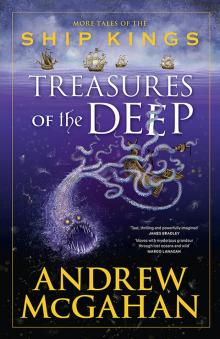 Treasures of the Deep
Treasures of the Deep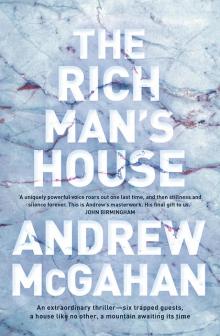 The Rich Man’s House
The Rich Man’s House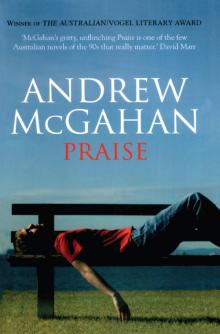 Praise
Praise The White Earth
The White Earth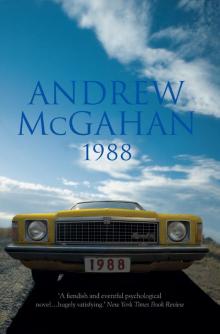 1988
1988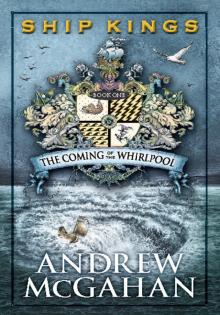 The Coming of the Whirlpool
The Coming of the Whirlpool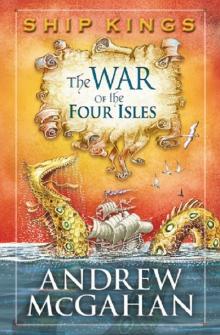 The War of the Four Isles
The War of the Four Isles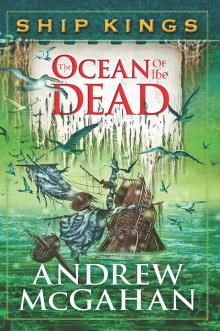 The Ocean of the Dead: Ship Kings 4
The Ocean of the Dead: Ship Kings 4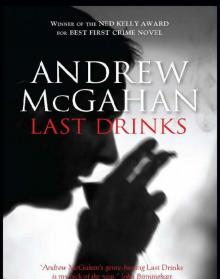 Last Drinks
Last Drinks Wonders of a Godless World
Wonders of a Godless World Underground
Underground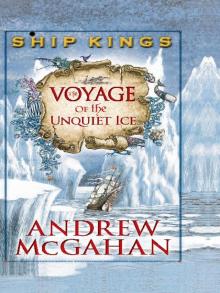 The Voyage of the Unquiet Ice
The Voyage of the Unquiet Ice